Self-help psychological books: do they even make any sense, and if so, which ones to choose?
Many do not like psychologists and psychology, but few deny the presence of people [in general, and not in person] psychological "troubles." Against this background, the idea to deal with these difficulties on their own may look attractive. This is used by authors and publishers offering all sorts of “self-help books”.
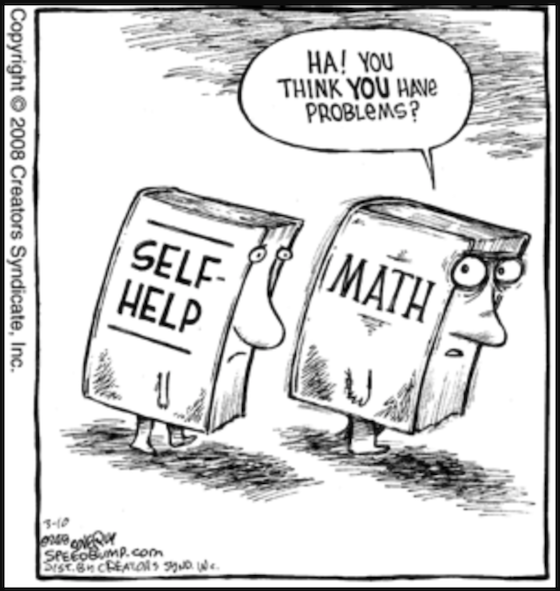
What's under the cat : a review of the literature on the study of [not] the effectiveness of independent work on psychological problems in books ( spoiler: effective, but with some reservations ), several lists of books that ( again, with reservations ) can be used for these purposes.
Let's immediately agree: despite the fact that the text will contain such words as “ depression ”, “ anxiety ”, “ OCD ” and other names of mental disorders, we will immediately accept it as a fact: for the treatment of mental illness, you should consult a psychiatrist or a psychotherapist (not a “psychologist-psychotherapist”, of whom there are now quite a few divorced, namely a doctor).
However, there is a fairly large category of people who, not formally meeting the diagnostic criteria of the ICD or DSM, experience significant psychological problems and experience difficulties in social adaptation.
Psychotherapists even offer alternative mental health assessment systems ( for example , Mc Williams's “16 Mental Health Criteria”) to classify them and classify them somewhere.
It is believed that these people are potential clients of psychologists, but many of them do not trust psychologists (and I perfectly understand them in this aspect), preferring to work on their own problems. Again, the factor of economic feasibility can play far from the last role.
Self-help books are designed for such people, of which a huge number is published every year around the world. The reading of such books can be attributed to the methods of bibliotherapy, which the Psychiatric Encyclopedic Dictionary defines as:
I propose moving on to assessing the possibilities and effectiveness of bibliotherapy in general and self-help literature in particular.
Let's start by assessing the effectiveness of traditional bibliotherapy, in which books are selected by a specialist. A 1995 meta-analysis [2] showed the absence of a significant difference in the effectiveness of classical therapy (which is direct real, with the therapist) and bibliotherapy.
According to the report, some problems (anxiety, lack of assertiveness, sexual dysfunctions) are more effective in the process of bibliotherapy, while others (learning problems, weight control, impulsive behavior) are still preferable to work with the therapist.
To this meta-analysis, I personally have a number of questions regarding the criteria for choosing the included studies and processing the results, but let it be.
A small meta-analysis [3] of 1997 showed the effectiveness of bibliotherapy in unipolar depression. In it, patients were offered “ CBT in the form of a book, ” and it was shown that this was no less effective than the usual [cognitive-behavioral] individual or group therapy. The included studies raise much fewer questions regarding their quality, but there are few of them, and the samples there are not too large either.
A 2003 meta-analysis [4] on the effectiveness of bibliotherapy in the treatment of alcohol dependence showed that there is some effect: not too large, but not significantly different from much larger-scale interventions.
In a 2004 meta-analysis [5], bibliotherapy is also recognized as a potentially effective tool. The data from the relevant report indicate that bibliotherapy can be an effective treatment for emotional disorders, such as anxiety disorders and depression, it is more effective than placebo, and in the short-term interval is comparable in effectiveness to professional treatment.
RCT [6] of 2015 (n = 63) showed the effectiveness of bibliotherapy in the fight against perfectionism and related stress (who are interested - the book was this one: Pavel Somov - Present Perfect ). Of course, it is impossible to draw conclusions on one RCT, but the results completely fit into the outline of other studies on the topic.
The meta-analysis [7] of 2016, dedicated to the treatment of obsessive-compulsive disorder, is somewhat out of this harmonious choir of singing odes of bibliotherapy and selfhelp. According to his results, the effect of bibliotherapy is proportional to the participation of the therapist in the treatment: the magnitude of the effect was small with completely independent use of bibliotherapy - contact with the therapist was once, upon initial examination (g = 0.33), average when the therapist was involved at the level of “explain that why is it done here ”(g = 0.68), and more with the active, but less than with the traditional therapy, involvement of the therapist. (g = 1.08).
Personally, it seems to me that the results of this study are somewhat out of the general series, not because the others evaluated the effectiveness of bibliotherapy mainly for anxiety and depression, but here for OCD, but because here, firstly, the correct questions about the degree the therapist’s involvement in the result, and, secondly, more appropriate statistical tools are used.
I would expect similar results from other studies with similar goals and design, you can consider this my prediction and poke my nose when / if it does not come true: I personally do not really believe in a full self help, as well as in self-diagnosis on psychological tests. But what is my opinion against these studies?
In a meta-analysis [8] of 2017, the long-term effect of bibliotherapy on the severity of symptoms of depression was studied. Conclusion: in adults over the long term, it decreases, for adolescents this effect has not been demonstrated.
In another meta-analysis [9] of the same year, non-pharmacological approaches to the treatment of depression in elderly patients were studied. Based on the results, it was concluded that bibliotherapy (among other approaches, such as CBT or problem-solving therapy) may be effective, at least in the short term, but more research is needed.
Finally, in a meta-analysis [10] of 2018, devoted to the study of the effectiveness of bibliotherapy in the treatment of anxiety and depression in children and adolescents, the effectiveness of bibliotherapy for depressed adolescents was shown.
Summary : many researchers do not fully share the concepts of bibliotherapy and self-help, considering the first as a subset of the second, although this is not always the case: bibliotherapy can be carried out both without the participation of a therapist and with his active involvement (moreover, there is evidence that this may work efficiency).
There is evidence of the effectiveness of bibliotherapy, self-help, or both at once, especially for anxiety and depression, but the level of evidence is still lower than for standard treatment - antidepressants and psychotherapy.
However, if for some reason it’s unacceptable or impossible for you to go to a specialist and you don’t have serious mental disorders (in this case, only a doctor!), You can try one (or several) of self-help books, there is a non-zero chance that it will be useful.
Most of the studies I know raise the question of the effectiveness of self-help literature and self-help in general, there is much less data on the comparative effectiveness of various books on this topic.
Against this background, the work of Richard E. Redding and co-authors [11], in which an attempt is made to make a comparative analysis of the “quality” of various self-help books, is very distinguished.
It can be called a “study” with a big stretch and only in quotation marks - no RCTs have been conducted here, but this is the best of what is at the moment.
The bottom line is quite simple: four experts with a degree in psychology (two eclecticists, one behaviorist and one biological psychologist) were asked to rate 50 popular (selected by rating on Amazon and in Barnes and Noble and Border stores) self-help books on five categories:
1 . how they relate to the ideas of modern scientific psychology;
2 . how realistic expectations they form in the reader;
3 . how much the proposed methods are focused on solving specific problems;
4 . how much the proposed methods are potentially harmful;
5 . how useful the book as a whole is - only 19 questions.
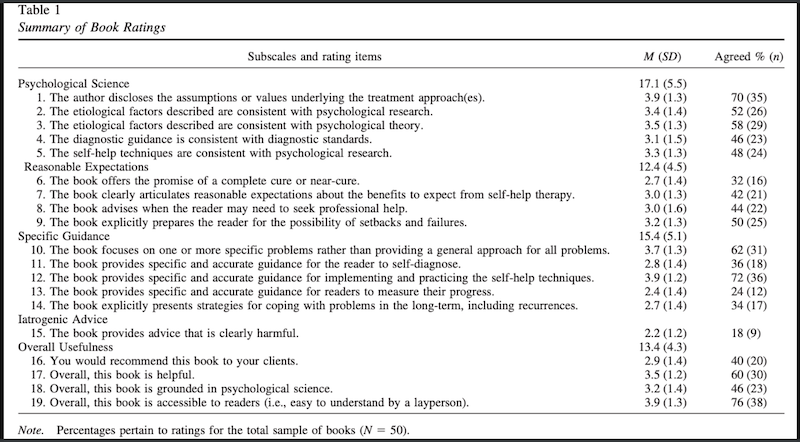
On each issue, the experts rated on the Likert scale. Randomization was carried out, everything is OK: the experts read the books (completely) in random order, gave grades, then the final score was calculated (the possible range is 19-95, the real spread is 34-94).
The result was a self-help literature rating (the list is sorted from the most highly rated books to the least):
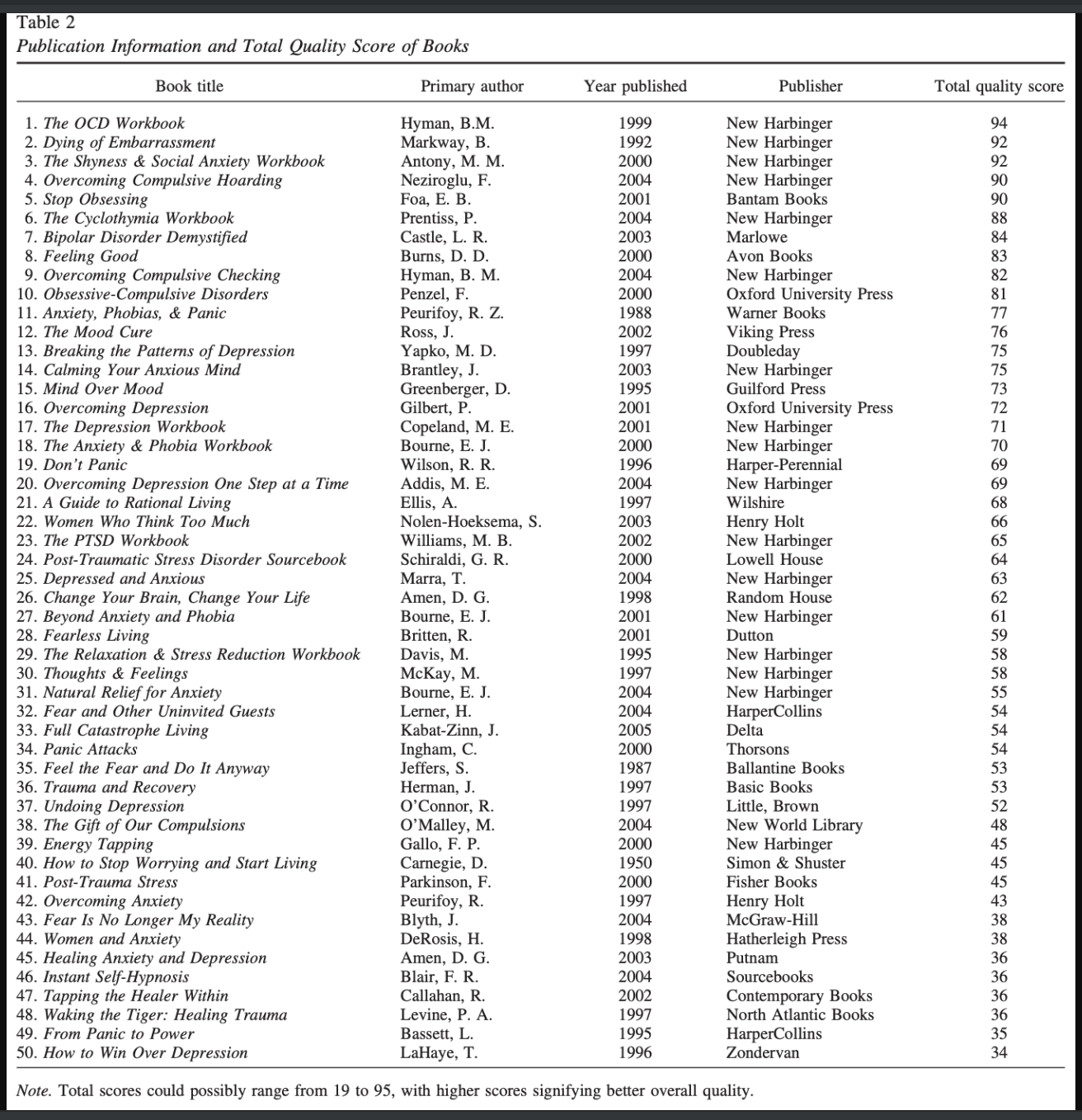
Rating of English literature on self-help [11]
Next, I propose to briefly consider the top ten.

Modality : cognitive-behavioral therapy (CBT);
Is there a translation : no;
Main focus : obsessive-compulsive disorder;
Short description : A good guide to OCD therapy, focused on cognitive-behavioral therapy and related areas (some ideas from ACT are visible to the naked eye). An interesting feature is the presence of a separate chapter on the question, “ And if all this did not work? ”With analysis of typical errors. Specific recommendations / techniques, links to research and an overall work plan are present.
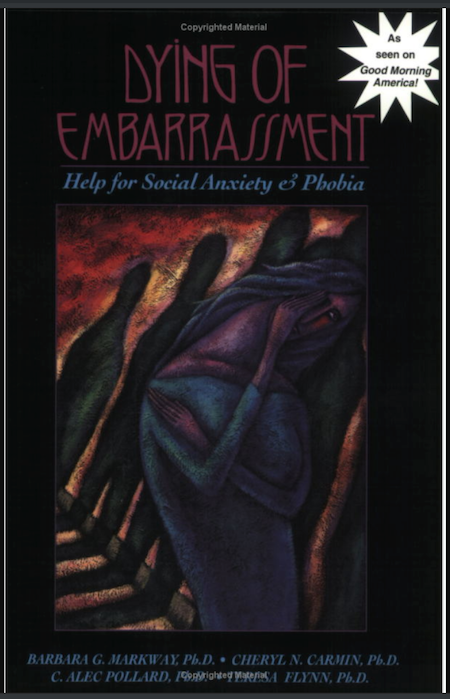
Modality : cognitive-behavioral therapy (CBT);
Is there a translation : no;
The main focus : sociophobia, anxiety;
Short description : it is quite easy to read, contains specific recommendations (and again you can see [if you wish] some intersection with ACT), links to sources and other attributes of good KPT literature on self-help. Despite the venerable age, it may well be used now - the basic CBT techniques have not changed much. But the links to research are somewhat outdated, not without it - new, more relevant work has appeared, and the standards for conducting these same studies have grown significantly since the 90s, but this does not make the book itself worse.
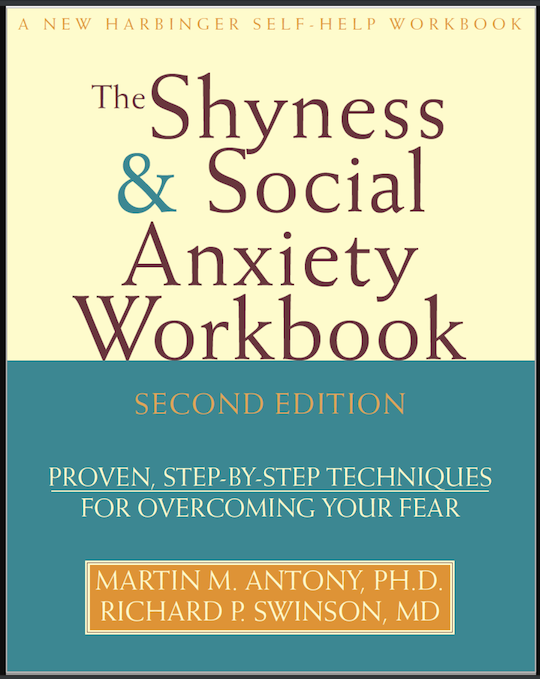
Modality : CBT (with a significant proportion of behavioral techniques);
Is there a translation : no;
Main focus : social anxiety, shyness,
Brief description : work that is fairly balanced in the combination of cognitive and behavioral techniques (it often happens that bias predominates either in working with automatic thoughts or in purely behavioral techniques). Very easy to read, very structured presentation of information. Concrete recommendations are given, a certain general plan of work is given.

Modality : cognitive-behavioral therapy (CBT);
Is there a translation : no;
Main focus : pathological hoarding;
Short description : the only book in the collection devoted specifically to pathological accumulation. The goal is to help the reader use the methods of cognitive and behavioral therapy to clear up the mess caused by the large number of accumulated things. Everything is brought up to this procedure, the reader is gradually prepared, given tools that will help to cope with the difficulties that arise, and then they offer to free up space from unnecessary things. The preparatory part discusses issues of motivation, basic fears and objections, as well as provides the necessary theoretical information on CBT.

Modality : cognitive-behavioral therapy (CBT);
Is there a translation : no;
Main focus : obsessive-compulsive disorder;
Short description : the book discusses various types of obsessions and compulsions, provides not just specific recommendations / exercises, but two holistic programs to combat manifestations of OCD (which are modular enough to use individual skills / techniques if necessary). A good balance between cognitive and behavioral aspects of therapy.
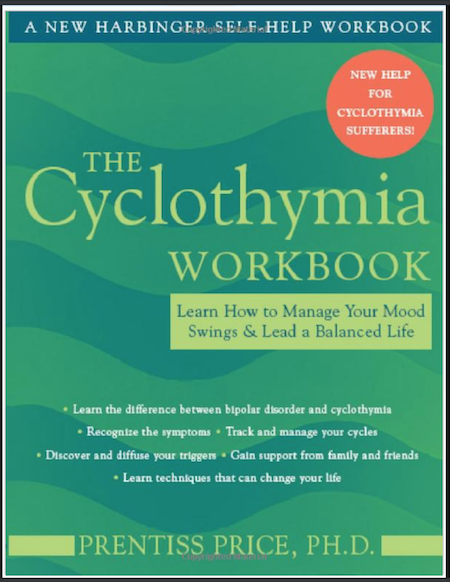
Modality : cognitive-behavioral therapy (CBT);
Is there a translation : no;
Main focus : cyclothymia;
Short description : the only book on cyclothymia in this collection (followed by a book on BAR, but this is different). The classic CPT book on self-help: in the first part, a theory explaining what cyclothymia is, why it is bad, what can be done with it; in the second part, a set of cognitive and behavioral techniques / recommendations for dealing with this disorder.
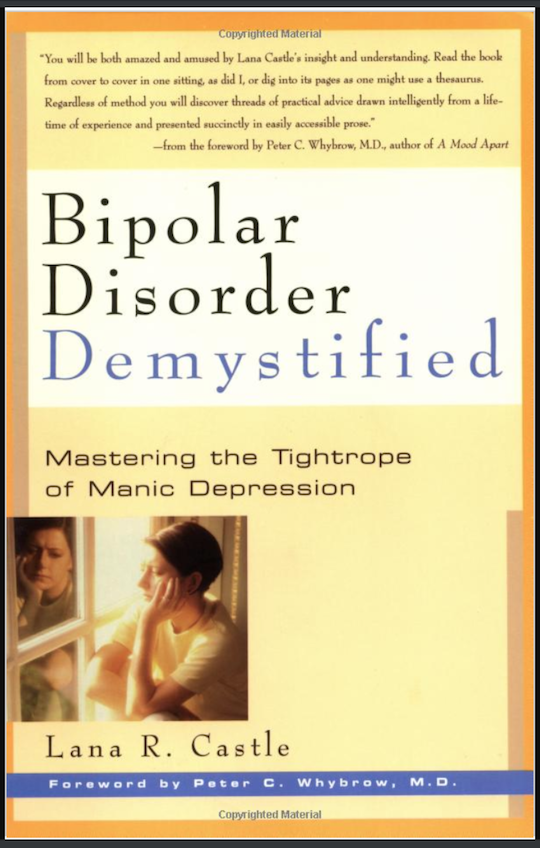
Modality : eclecticism, psycho-education;
Is there a translation : no;
Main focus : bipolar affective disorder;
Short description : I can not say that there is any one direction of therapy, in which BAR is considered. The book consists of three parts: the first discusses life with bipolar disorder, including complex issues such as suicide and discontinuation of treatment. The second part examines the biochemical and psychological aspects of the disease, including an analysis of the "myth of improper parental care." In the third part, specific recommendations are considered, including psychotherapy, physical exercises, lifestyle changes, etc.
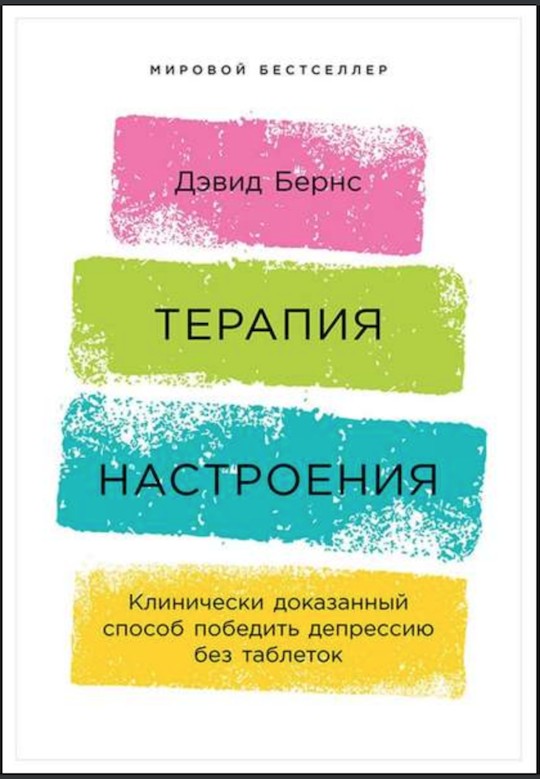
Modality : cognitive-behavioral therapy (CBT);
Is there a translation : yes, “Well-being. New mood therapy ”/“ Mood Therapy. A clinically proven way to beat depression without pills. ”
Main focus : depression;
Short description : this book is one of the most frequently come across to me in studies evaluating the effectiveness of self-help / bibliotherapy. The book proposes a cognitive theory of depression, examines automatic thoughts, provides examples of the use of CBT methods to solve common problems (with self-esteem, guilt, perfectionism, inability to cope with criticism, etc.), and also discusses the medical treatment of depression.

Modality : behavioral therapy, ERPA (Exposure Ritual Prevention and Awareness);
Is there a translation: no;
Main focus : obsessive-compulsive disorder;
Short description : despite the fact that Hyman [11] is indicated in the study as the author of this work, as you can see by carefully looking at the screenshot in the previous section, the author’s book with this title did not appear in this publishing house in 2004. But the book was published by Paul M. Munford, whose cover is presented in the illustration. The book focuses on one aspect of OCD: compulsive [re] checks. This focus allows you to more accurately "get into the symptom." The main proposed solution is exposure / desensitization.
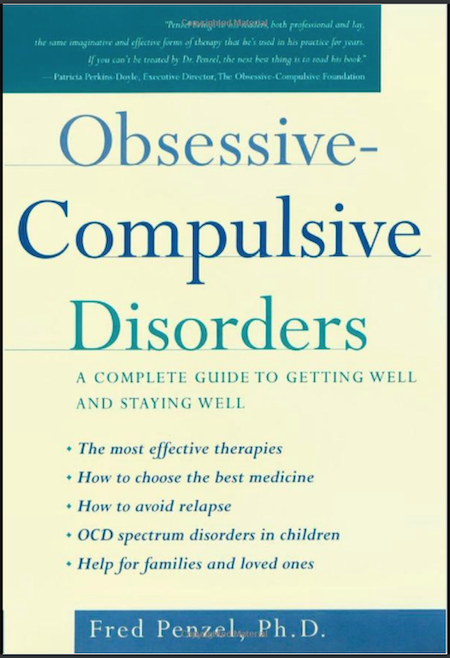
Modality : cognitive-behavioral therapy (CBT);
Is there a translation : no;
The main focus : obsessive-compulsive disorder, "related" disorders;
Brief description : the difference between this book is that it considers not only "classical OCD", but also "related" disorders: dysmorphophobia, trichotillomania, neurotic excoriation, onychophagy. A conceptualization of disorders from the point of view of CBT is given, specific techniques for combating compulsions are given, drug treatment is discussed in sufficient detail, disorders of the obsessive-compulsive spectrum in children, questions of comorbidity and differential diagnosis are considered. The book is written to a large extent from the perspective of a clinician, but is also suitable for self-help.
This is also a book. In English. Pretty old (2003), but very detailed. Honestly, it is so different from everything else on this topic that I decided to put it in a separate section.
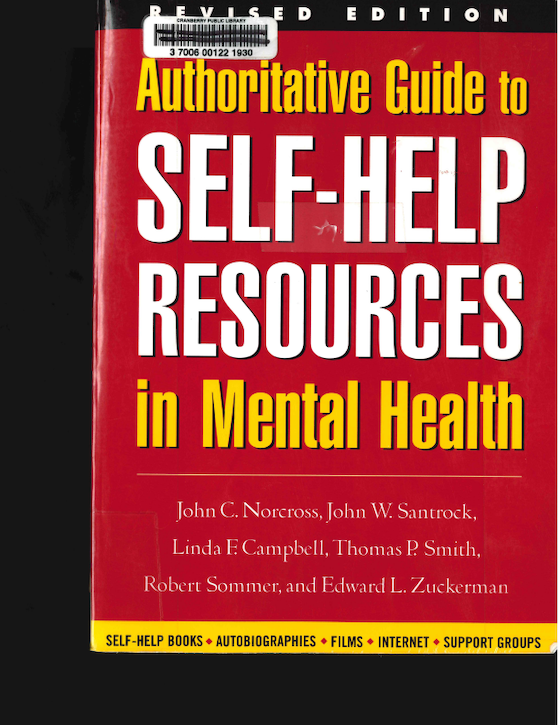
2003 edition cover
This publication is a directory of reviews of self-help books, relevant films, online resources, autobiographies and support groups (in the USA), equipped with author's comments, recommendations, etc.
If you speak the language, then perhaps this is the best catalog of such products available today. The authors are experienced psychologists with a bunch of regalia and experience: clinical and “ordinary”.
Naturally, I do not have the opportunity to evaluate all the recommendations presented, but those that I know are adequate.
All resources are grouped by topics corresponding to one or another mental disorder or stressful experience:
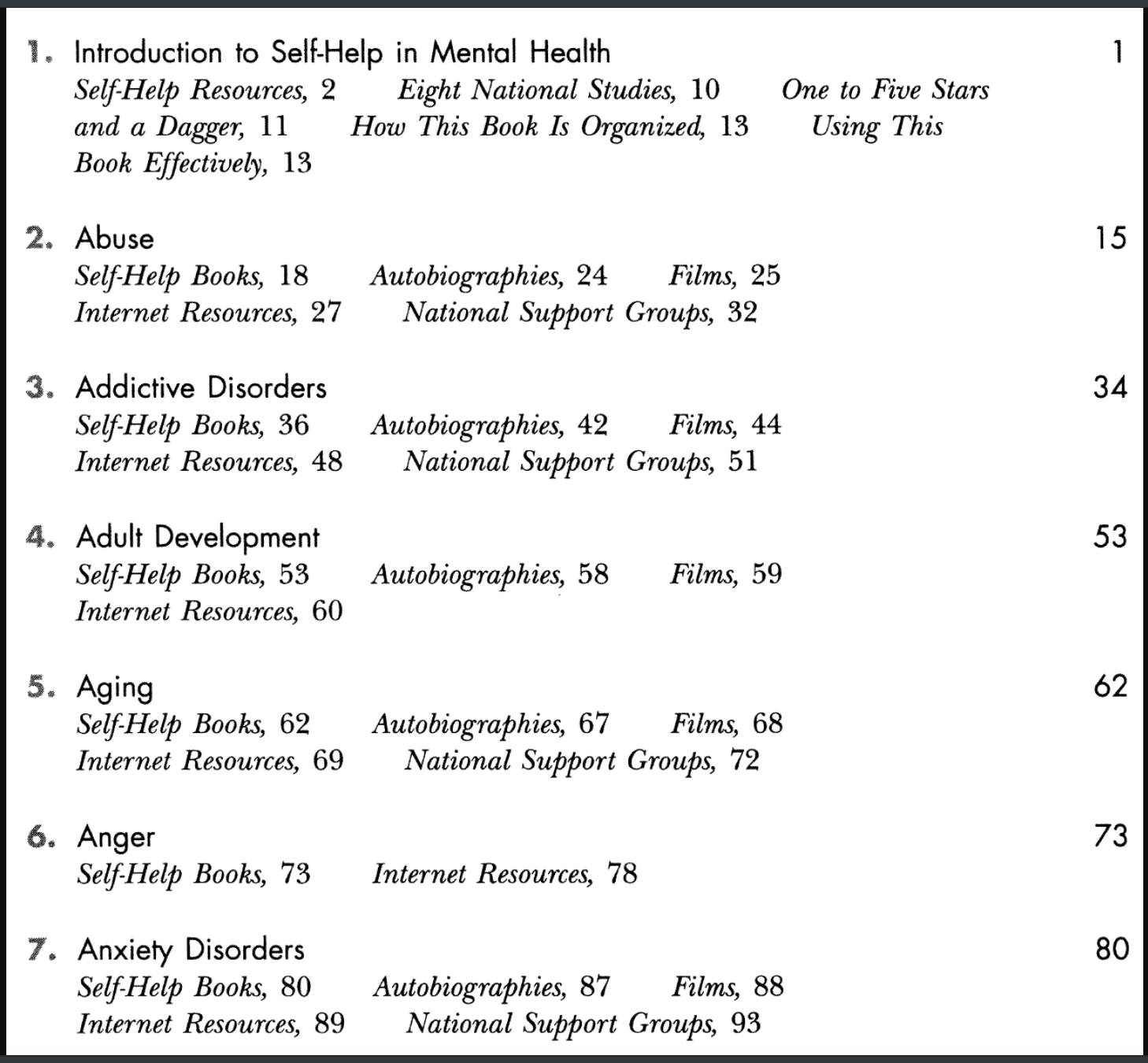
Table of Contents Example
At the beginning of each chapter, a short list of “most-most” is given:
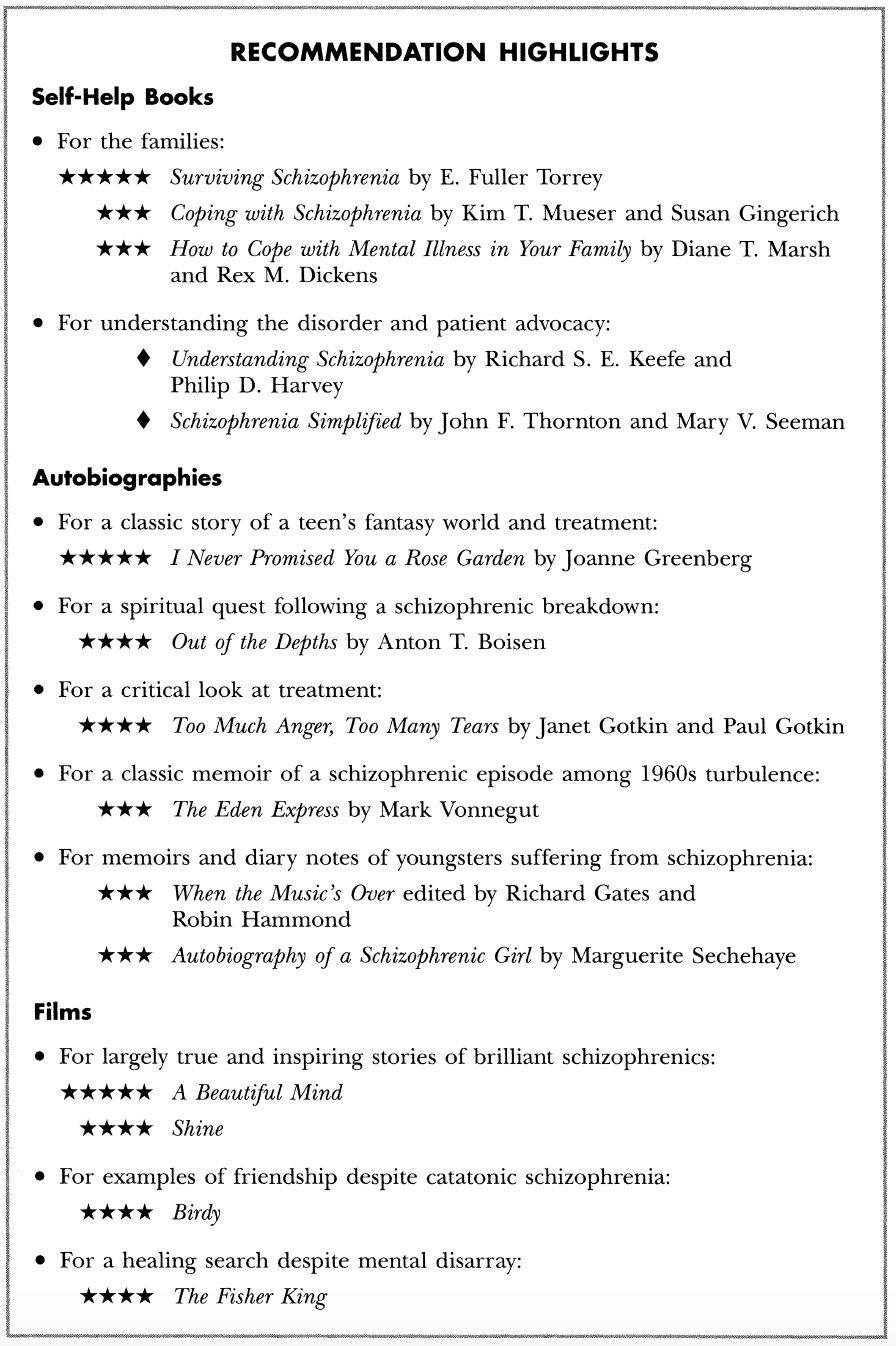
Beginning chapter example
Convenient, structured, with a brief description of what the book / film contains and why you should read it:
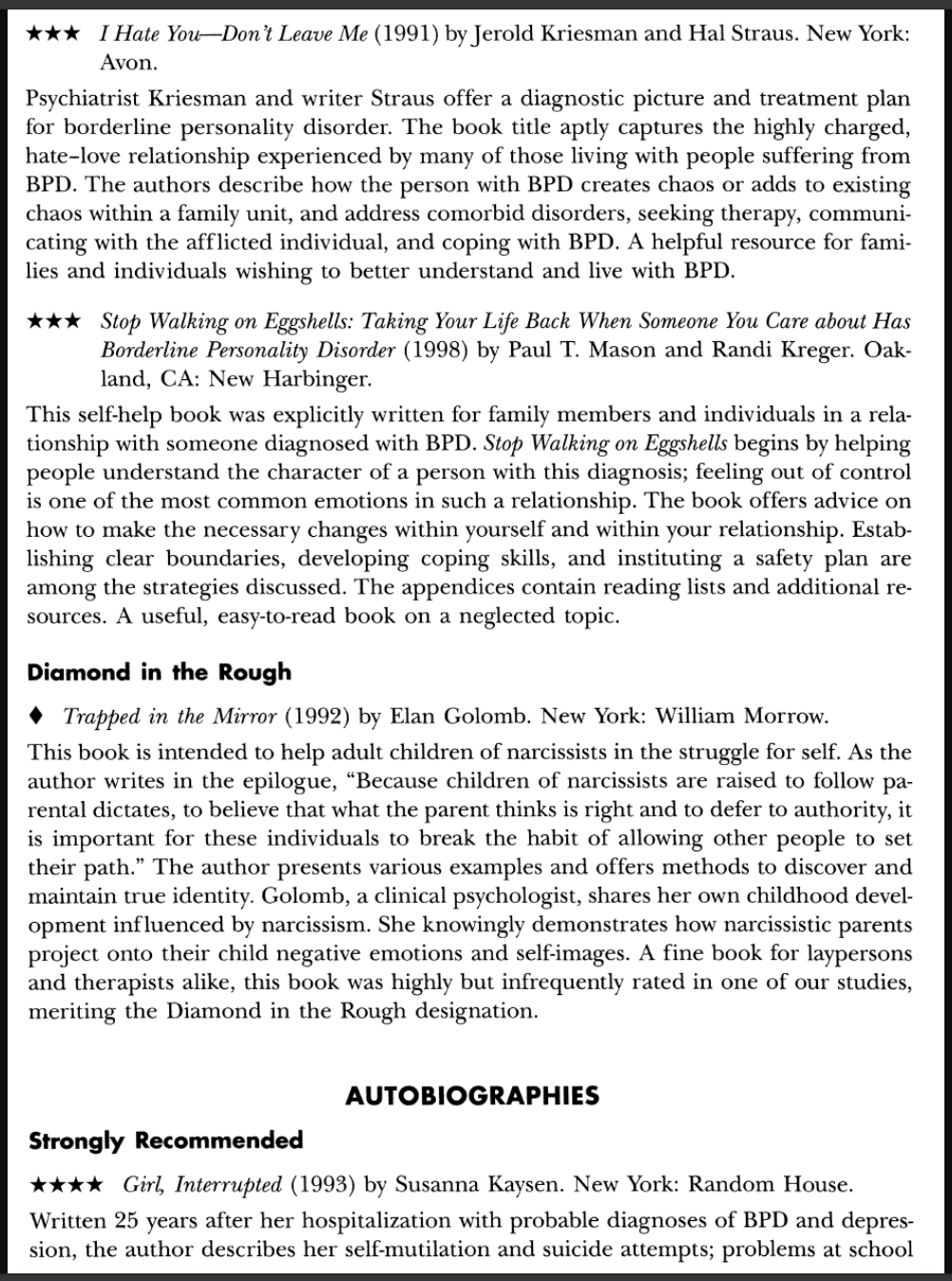
Chapter body example
The book is well-deserved respect among Western experts, in some studies on self-help literature there are links to it. Of course, it does not reach the level of evidence adopted in "real" evidence-based medicine (this is just the opinion of a group of experts, they did not do any RCT), but this is the best we have.
In principle, if you take a book from the recommended ones, there is a high probability that it will be useful to you.
Actually, I would like to make another list - “The 10 best self-help books, in my opinion”, but personally I am rather skeptical about the idea of completely autonomous independent work on mental problems, so I can not recommend anything concrete in the self-help format.
However, the works presented below, in my opinion, are excellent for bibliotherapy with some [not too strong compared to traditional therapy] involvement of a therapist (in the broad sense of the word, including a psychologist), as well as to complement traditional therapy.
Some works are, let's say, [ at least! ] debatable, and therefore they are valuable in this format: they raise quite interesting questions that can be worked out in therapy.
Yes, not all of them offer approaches that have proven effectiveness, and that’s why I’m not talking about them as self-help tools, but as a catalyst for therapy , in my opinion, they are quite suitable and add additional value to the process as such .
As you can see, the list is very different from the one obtained by Richard E. Redding and co-authors, and the reasons are not only in the difference in academic preparation, but also in some cultural differences, as well as in what I tried to include in my list the maximum amount of literature in Russian (at least in the [not always perfect] translation).
I do not recommend anyone to be “ treated ” by these books (doctors should be treated!), And ask you to be careful and prudent when trying to solve your problems yourself, as well as use common sense and critical thinking skills.
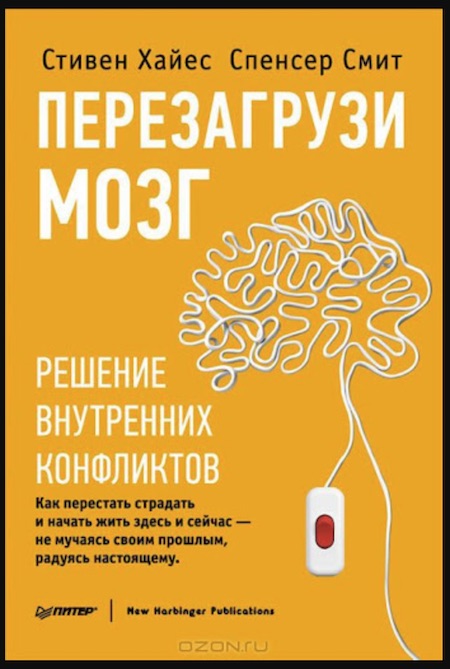
Modality : acceptance and commitment therapy (ACT)
The main focus : anxiety, depression (but not only);
Short description : probably the only book from the entire list, which can rightly be attributed to the category of self-help literature.The author gives some theoretical considerations, and then a very large number of specific techniques and exercises follow. Some of them will probably be familiar to the Gestaltists, some to followers of various kinds of mindfulnesses, but on the whole, nothing terrible and absolutely esoteric. What frankly I didn’t like was the assurances that “ this book will definitely help you ” - there is a feeling that the author is trying to sell something (this is how strange I react to an innocuous suggestion, yes). But everything is very structured, consistent and generally convenient for use in every way.
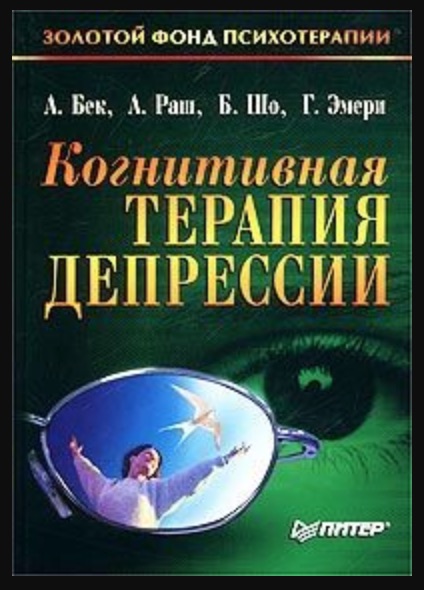
Modality : cognitive-behavioral therapy;
Main focus : depression;
Short Description : classic work on cognitive therapy. Despite the fact that it was written a very long time ago, it still remains relevant. One of the most comprehensible books on K [P] T (much more understandable than “ Cognitive Therapy: A Complete Guide ” by Judith Beck, as for me). The presentation structure is perfectly maintained, a certain number of specific techniques and techniques- is given. The book is intended for specialists, but, unlike Mc Williams' Psychoanalytic Diagnostics, it’s written very clearly, with a minimal amount of corresponding “jargon” (this is typical for CBT). Despite the fact that it is not formally intended for self-help, in my opinion, it is quite suitable for this purpose.
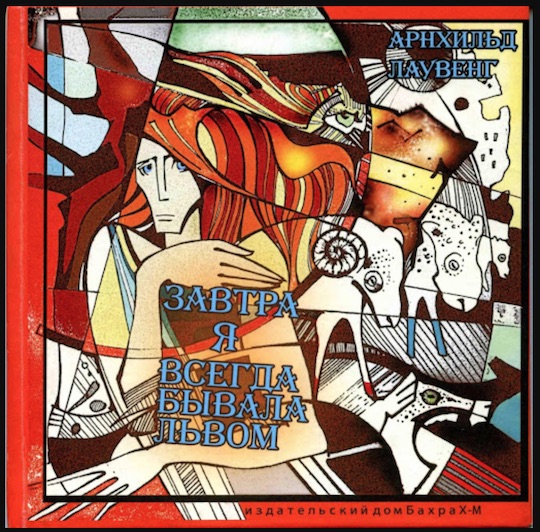
Modality : absent, the book does not have a therapeutic focus;
The main focus : people suffering from disorders of the schizophrenic spectrum, their relatives;
Short description : this work under no consideration can be classified as self-help books - it does not contain any specific recommendations, methods, it does not even clearly state the theoretical part: just the personal experience of the author. Why did she get on this list? Because the book can become a source of some validation both for the person who has the corresponding disorder, and for his family and friends. I liked the figurative presentation, kindness, sympathy of the author for himself and for all living things: a kind of “ anti-stigma ”. But do not look here "recommendations for the treatment of schizophrenia, "the book is not about that.

Modality : transactional analysis;
Main focus : human relationships;
Short description : what I like about this book is how it presents, beautifully and with concrete examples, the idea that a person can perform certain actions for a completely different purpose from which he declares. It is this aspect, and not Berne’s theory itself with its games, scripts and Inner Children / Adults / Parents (I like these guys more from Young) that seems most interesting to me. Again, this is not quite a guide for self-help, but it is written quite clearly, you can use it for these purposes too.

Modality : psychodynamics, psychoanalysis;
Main focus : clinical diagnosis;
Short description : generally speaking, this is a textbook, and even on psychoanalysis. But do not rush to throw me rotten tomatoes: having gotten through a very specific jargon (and not always a successful translation), the reader can get some useful information about people of interest to him in the context of understanding their character. I have not seen such a beautiful description of schizoids as that of Mc Williams (see also her Reflections on Schizoid Dynamics). In addition, psychic defenses, the concept of personality organization levels, and other psychoanalytic things that are widely used in clinical practice by specialists belonging to various schools are well-painted.
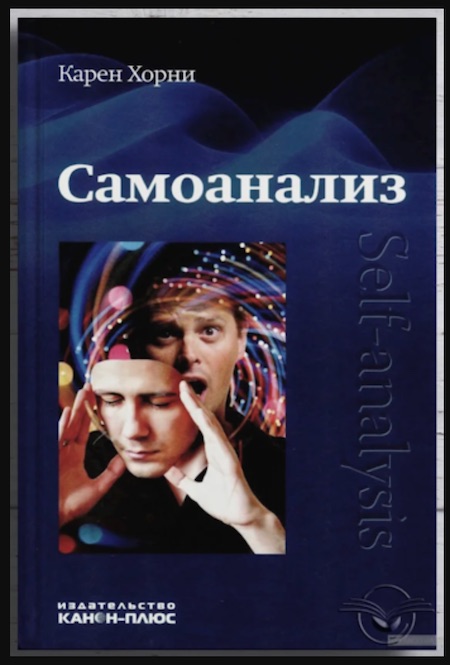
Modality : psychoanalysis;
The main focus : "neurosis" (fatigue, a sense of uncertainty, general dissatisfaction, etc.);
Short description : another book on psychoanalysis, and even so old! Nevertheless, it seems interesting to me: the theory of Horney’s neurosis is presented quite simply and clearly, the author discusses the limits of applicability of the self-help (even if it’s not called), with which I agree. I usually recommend it to those who are interested in psychoanalysis, know about its limitations and problems, but nonetheless want to try it for themselves. A complete and accurate opinion cannot be drawn up, but to get some approximate impressions is quite.

Modality : speech therapy;
The main focus : life orientation;
Short description : I do not like speech therapy and the very question of the meaning of life, considering it meaningless, but I am well aware that there are people who look at it completely differently. I heard a number of very positive reviews about the book as an effective tool for self-help, but I did not see any convincing data confirming this.
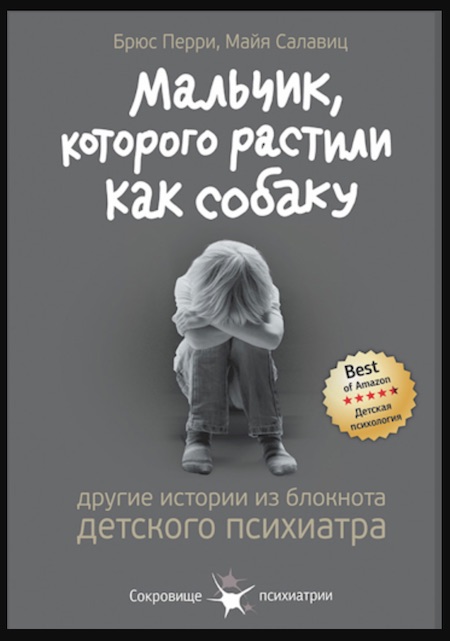
Modality : no, the book is more about child psychiatry than about psychology / “neuroconsecutive approach”, psycho-education;
Main focus : abuse, parent-child relationship;
Short description : does not contain specific instructions and exercises, just a collection of stories of children who have suffered serious mental injuries, provided with comments by the author. Good - simple, but with the preservation of meaning, some provisions of developmental psychology and child psychiatry are conveyed. It is distinguished by warmth and humanity. It can be useful for both parents and adults / adolescents who were injured in childhood.

Modality : psychedelic therapy;
The main focus : difficult to describe, claims to be universal;
Short description : the most “sober”, for my taste, Grof’s work, in which he has not gone too far into the astral distances [by the standards of later works], but rather carefully describes what he saw and gives some cautious interpretations. Personally, I’m interested in his concept of RMS, which can be used as a fairly convenient model for describing some experiences. In addition, the book often provokes a rather controversial and strong reaction, and these experiences can be effectively used in therapy.

Modality : eclecticism, contains approaches from completely different directions;
Main focus : abuse, parent-child relationship;
Short description: I thought for a long time whether to include the book in this list. I definitely do not recommend it as a literature for self-help: the information is presented too one-sidedly in it, the accents are too strongly placed, the risk is too great for the reader to commit something that she will regret under her influence. But sometimes, with proper reading and critical processing and reflection on the ideas of the author, this book can be very useful. There are specific exercises, and some [rather controversial] theory, and some quite clearly defined sequence of actions, but this same one-sidedness and categorization spoils everything. By the way, in the same publication, “Authoritative guide to self-help resources in mental health”, this book is included in the list of unequivocally recommended.

What's under the cat : a review of the literature on the study of [not] the effectiveness of independent work on psychological problems in books ( spoiler: effective, but with some reservations ), several lists of books that ( again, with reservations ) can be used for these purposes.
Selfhelp literature and bibliotherapy
Let's immediately agree: despite the fact that the text will contain such words as “ depression ”, “ anxiety ”, “ OCD ” and other names of mental disorders, we will immediately accept it as a fact: for the treatment of mental illness, you should consult a psychiatrist or a psychotherapist (not a “psychologist-psychotherapist”, of whom there are now quite a few divorced, namely a doctor).
However, there is a fairly large category of people who, not formally meeting the diagnostic criteria of the ICD or DSM, experience significant psychological problems and experience difficulties in social adaptation.
Psychotherapists even offer alternative mental health assessment systems ( for example , Mc Williams's “16 Mental Health Criteria”) to classify them and classify them somewhere.
It is believed that these people are potential clients of psychologists, but many of them do not trust psychologists (and I perfectly understand them in this aspect), preferring to work on their own problems. Again, the factor of economic feasibility can play far from the last role.
Self-help books are designed for such people, of which a huge number is published every year around the world. The reading of such books can be attributed to the methods of bibliotherapy, which the Psychiatric Encyclopedic Dictionary defines as:
The psychotherapeutic method, expressed in a special selection of literature for patients. Most often under B., the therapeutic effect on the psyche of a sick person by reading books. Reading treatment is included as one of the links in the psychotherapy system. B.'s technique is a complex combination of book science, psychology and psychotherapy [1, p. 114]In this definition, it is assumed that a specialist will select books for reading (and, in fact, not the fact that it will be self-help literature), but this rather indicates a conservative vocabulary than that such a phenomenon as “ self-medication books ”does not exist.
I propose moving on to assessing the possibilities and effectiveness of bibliotherapy in general and self-help literature in particular.
The Effectiveness of “Work on Books”: A Literature Review
Let's start by assessing the effectiveness of traditional bibliotherapy, in which books are selected by a specialist. A 1995 meta-analysis [2] showed the absence of a significant difference in the effectiveness of classical therapy (which is direct real, with the therapist) and bibliotherapy.
According to the report, some problems (anxiety, lack of assertiveness, sexual dysfunctions) are more effective in the process of bibliotherapy, while others (learning problems, weight control, impulsive behavior) are still preferable to work with the therapist.
To this meta-analysis, I personally have a number of questions regarding the criteria for choosing the included studies and processing the results, but let it be.
A small meta-analysis [3] of 1997 showed the effectiveness of bibliotherapy in unipolar depression. In it, patients were offered “ CBT in the form of a book, ” and it was shown that this was no less effective than the usual [cognitive-behavioral] individual or group therapy. The included studies raise much fewer questions regarding their quality, but there are few of them, and the samples there are not too large either.
A 2003 meta-analysis [4] on the effectiveness of bibliotherapy in the treatment of alcohol dependence showed that there is some effect: not too large, but not significantly different from much larger-scale interventions.
In a 2004 meta-analysis [5], bibliotherapy is also recognized as a potentially effective tool. The data from the relevant report indicate that bibliotherapy can be an effective treatment for emotional disorders, such as anxiety disorders and depression, it is more effective than placebo, and in the short-term interval is comparable in effectiveness to professional treatment.
RCT [6] of 2015 (n = 63) showed the effectiveness of bibliotherapy in the fight against perfectionism and related stress (who are interested - the book was this one: Pavel Somov - Present Perfect ). Of course, it is impossible to draw conclusions on one RCT, but the results completely fit into the outline of other studies on the topic.
The meta-analysis [7] of 2016, dedicated to the treatment of obsessive-compulsive disorder, is somewhat out of this harmonious choir of singing odes of bibliotherapy and selfhelp. According to his results, the effect of bibliotherapy is proportional to the participation of the therapist in the treatment: the magnitude of the effect was small with completely independent use of bibliotherapy - contact with the therapist was once, upon initial examination (g = 0.33), average when the therapist was involved at the level of “explain that why is it done here ”(g = 0.68), and more with the active, but less than with the traditional therapy, involvement of the therapist. (g = 1.08).
Personally, it seems to me that the results of this study are somewhat out of the general series, not because the others evaluated the effectiveness of bibliotherapy mainly for anxiety and depression, but here for OCD, but because here, firstly, the correct questions about the degree the therapist’s involvement in the result, and, secondly, more appropriate statistical tools are used.
I would expect similar results from other studies with similar goals and design, you can consider this my prediction and poke my nose when / if it does not come true: I personally do not really believe in a full self help, as well as in self-diagnosis on psychological tests. But what is my opinion against these studies?
In a meta-analysis [8] of 2017, the long-term effect of bibliotherapy on the severity of symptoms of depression was studied. Conclusion: in adults over the long term, it decreases, for adolescents this effect has not been demonstrated.
In another meta-analysis [9] of the same year, non-pharmacological approaches to the treatment of depression in elderly patients were studied. Based on the results, it was concluded that bibliotherapy (among other approaches, such as CBT or problem-solving therapy) may be effective, at least in the short term, but more research is needed.
Finally, in a meta-analysis [10] of 2018, devoted to the study of the effectiveness of bibliotherapy in the treatment of anxiety and depression in children and adolescents, the effectiveness of bibliotherapy for depressed adolescents was shown.
Summary : many researchers do not fully share the concepts of bibliotherapy and self-help, considering the first as a subset of the second, although this is not always the case: bibliotherapy can be carried out both without the participation of a therapist and with his active involvement (moreover, there is evidence that this may work efficiency).
There is evidence of the effectiveness of bibliotherapy, self-help, or both at once, especially for anxiety and depression, but the level of evidence is still lower than for standard treatment - antidepressants and psychotherapy.
However, if for some reason it’s unacceptable or impossible for you to go to a specialist and you don’t have serious mental disorders (in this case, only a doctor!), You can try one (or several) of self-help books, there is a non-zero chance that it will be useful.
The Most Effective Self Help Books: Comparative Characteristics
Most of the studies I know raise the question of the effectiveness of self-help literature and self-help in general, there is much less data on the comparative effectiveness of various books on this topic.
Against this background, the work of Richard E. Redding and co-authors [11], in which an attempt is made to make a comparative analysis of the “quality” of various self-help books, is very distinguished.
It can be called a “study” with a big stretch and only in quotation marks - no RCTs have been conducted here, but this is the best of what is at the moment.
The bottom line is quite simple: four experts with a degree in psychology (two eclecticists, one behaviorist and one biological psychologist) were asked to rate 50 popular (selected by rating on Amazon and in Barnes and Noble and Border stores) self-help books on five categories:
1 . how they relate to the ideas of modern scientific psychology;
2 . how realistic expectations they form in the reader;
3 . how much the proposed methods are focused on solving specific problems;
4 . how much the proposed methods are potentially harmful;
5 . how useful the book as a whole is - only 19 questions.

On each issue, the experts rated on the Likert scale. Randomization was carried out, everything is OK: the experts read the books (completely) in random order, gave grades, then the final score was calculated (the possible range is 19-95, the real spread is 34-94).
The result was a self-help literature rating (the list is sorted from the most highly rated books to the least):

Rating of English literature on self-help [11]
Next, I propose to briefly consider the top ten.
Hyman, BM - The OCD Workbook

Modality : cognitive-behavioral therapy (CBT);
Is there a translation : no;
Main focus : obsessive-compulsive disorder;
Short description : A good guide to OCD therapy, focused on cognitive-behavioral therapy and related areas (some ideas from ACT are visible to the naked eye). An interesting feature is the presence of a separate chapter on the question, “ And if all this did not work? ”With analysis of typical errors. Specific recommendations / techniques, links to research and an overall work plan are present.
Markway, B. - Dying of Embarrassment

Modality : cognitive-behavioral therapy (CBT);
Is there a translation : no;
The main focus : sociophobia, anxiety;
Short description : it is quite easy to read, contains specific recommendations (and again you can see [if you wish] some intersection with ACT), links to sources and other attributes of good KPT literature on self-help. Despite the venerable age, it may well be used now - the basic CBT techniques have not changed much. But the links to research are somewhat outdated, not without it - new, more relevant work has appeared, and the standards for conducting these same studies have grown significantly since the 90s, but this does not make the book itself worse.
Antony, MM - The Shyness & Social Anxiety Workbook

Modality : CBT (with a significant proportion of behavioral techniques);
Is there a translation : no;
Main focus : social anxiety, shyness,
Brief description : work that is fairly balanced in the combination of cognitive and behavioral techniques (it often happens that bias predominates either in working with automatic thoughts or in purely behavioral techniques). Very easy to read, very structured presentation of information. Concrete recommendations are given, a certain general plan of work is given.
Neziroglu, F. - Overcoming Compulsive Hoarding

Modality : cognitive-behavioral therapy (CBT);
Is there a translation : no;
Main focus : pathological hoarding;
Short description : the only book in the collection devoted specifically to pathological accumulation. The goal is to help the reader use the methods of cognitive and behavioral therapy to clear up the mess caused by the large number of accumulated things. Everything is brought up to this procedure, the reader is gradually prepared, given tools that will help to cope with the difficulties that arise, and then they offer to free up space from unnecessary things. The preparatory part discusses issues of motivation, basic fears and objections, as well as provides the necessary theoretical information on CBT.
Foa, EB - Stop Obsessing

Modality : cognitive-behavioral therapy (CBT);
Is there a translation : no;
Main focus : obsessive-compulsive disorder;
Short description : the book discusses various types of obsessions and compulsions, provides not just specific recommendations / exercises, but two holistic programs to combat manifestations of OCD (which are modular enough to use individual skills / techniques if necessary). A good balance between cognitive and behavioral aspects of therapy.
Prentiss, P. - The Cyclothymia Workbook

Modality : cognitive-behavioral therapy (CBT);
Is there a translation : no;
Main focus : cyclothymia;
Short description : the only book on cyclothymia in this collection (followed by a book on BAR, but this is different). The classic CPT book on self-help: in the first part, a theory explaining what cyclothymia is, why it is bad, what can be done with it; in the second part, a set of cognitive and behavioral techniques / recommendations for dealing with this disorder.
Castle, LR - Bipolar Disorder Demystified

Modality : eclecticism, psycho-education;
Is there a translation : no;
Main focus : bipolar affective disorder;
Short description : I can not say that there is any one direction of therapy, in which BAR is considered. The book consists of three parts: the first discusses life with bipolar disorder, including complex issues such as suicide and discontinuation of treatment. The second part examines the biochemical and psychological aspects of the disease, including an analysis of the "myth of improper parental care." In the third part, specific recommendations are considered, including psychotherapy, physical exercises, lifestyle changes, etc.
Burns, DD - Feeling Good

Modality : cognitive-behavioral therapy (CBT);
Is there a translation : yes, “Well-being. New mood therapy ”/“ Mood Therapy. A clinically proven way to beat depression without pills. ”
Main focus : depression;
Short description : this book is one of the most frequently come across to me in studies evaluating the effectiveness of self-help / bibliotherapy. The book proposes a cognitive theory of depression, examines automatic thoughts, provides examples of the use of CBT methods to solve common problems (with self-esteem, guilt, perfectionism, inability to cope with criticism, etc.), and also discusses the medical treatment of depression.
Hyman, BM - Overcoming Compulsive Checking

Modality : behavioral therapy, ERPA (Exposure Ritual Prevention and Awareness);
Is there a translation: no;
Main focus : obsessive-compulsive disorder;
Short description : despite the fact that Hyman [11] is indicated in the study as the author of this work, as you can see by carefully looking at the screenshot in the previous section, the author’s book with this title did not appear in this publishing house in 2004. But the book was published by Paul M. Munford, whose cover is presented in the illustration. The book focuses on one aspect of OCD: compulsive [re] checks. This focus allows you to more accurately "get into the symptom." The main proposed solution is exposure / desensitization.
Penzel, F. - Obsessive-Compulsive Disorders

Modality : cognitive-behavioral therapy (CBT);
Is there a translation : no;
The main focus : obsessive-compulsive disorder, "related" disorders;
Brief description : the difference between this book is that it considers not only "classical OCD", but also "related" disorders: dysmorphophobia, trichotillomania, neurotic excoriation, onychophagy. A conceptualization of disorders from the point of view of CBT is given, specific techniques for combating compulsions are given, drug treatment is discussed in sufficient detail, disorders of the obsessive-compulsive spectrum in children, questions of comorbidity and differential diagnosis are considered. The book is written to a large extent from the perspective of a clinician, but is also suitable for self-help.
John C. Norcross, John W. Santrock - Authoritative guide to self-help resources in mental health
This is also a book. In English. Pretty old (2003), but very detailed. Honestly, it is so different from everything else on this topic that I decided to put it in a separate section.

2003 edition cover
This publication is a directory of reviews of self-help books, relevant films, online resources, autobiographies and support groups (in the USA), equipped with author's comments, recommendations, etc.
If you speak the language, then perhaps this is the best catalog of such products available today. The authors are experienced psychologists with a bunch of regalia and experience: clinical and “ordinary”.
Naturally, I do not have the opportunity to evaluate all the recommendations presented, but those that I know are adequate.
All resources are grouped by topics corresponding to one or another mental disorder or stressful experience:

Table of Contents Example
At the beginning of each chapter, a short list of “most-most” is given:

Beginning chapter example
Convenient, structured, with a brief description of what the book / film contains and why you should read it:

Chapter body example
The book is well-deserved respect among Western experts, in some studies on self-help literature there are links to it. Of course, it does not reach the level of evidence adopted in "real" evidence-based medicine (this is just the opinion of a group of experts, they did not do any RCT), but this is the best we have.
In principle, if you take a book from the recommended ones, there is a high probability that it will be useful to you.
My personal top list: 10 books for bibliotherapy
Actually, I would like to make another list - “The 10 best self-help books, in my opinion”, but personally I am rather skeptical about the idea of completely autonomous independent work on mental problems, so I can not recommend anything concrete in the self-help format.
However, the works presented below, in my opinion, are excellent for bibliotherapy with some [not too strong compared to traditional therapy] involvement of a therapist (in the broad sense of the word, including a psychologist), as well as to complement traditional therapy.
Some works are, let's say, [ at least! ] debatable, and therefore they are valuable in this format: they raise quite interesting questions that can be worked out in therapy.
Yes, not all of them offer approaches that have proven effectiveness, and that’s why I’m not talking about them as self-help tools, but as a catalyst for therapy , in my opinion, they are quite suitable and add additional value to the process as such .
As you can see, the list is very different from the one obtained by Richard E. Redding and co-authors, and the reasons are not only in the difference in academic preparation, but also in some cultural differences, as well as in what I tried to include in my list the maximum amount of literature in Russian (at least in the [not always perfect] translation).
I do not recommend anyone to be “ treated ” by these books (doctors should be treated!), And ask you to be careful and prudent when trying to solve your problems yourself, as well as use common sense and critical thinking skills.
Stephen Hayes - Restart Your Brain

Modality : acceptance and commitment therapy (ACT)
The main focus : anxiety, depression (but not only);
Short description : probably the only book from the entire list, which can rightly be attributed to the category of self-help literature.The author gives some theoretical considerations, and then a very large number of specific techniques and exercises follow. Some of them will probably be familiar to the Gestaltists, some to followers of various kinds of mindfulnesses, but on the whole, nothing terrible and absolutely esoteric. What frankly I didn’t like was the assurances that “ this book will definitely help you ” - there is a feeling that the author is trying to sell something (this is how strange I react to an innocuous suggestion, yes). But everything is very structured, consistent and generally convenient for use in every way.
Aaron Beck - Cognitive Therapy for Depression

Modality : cognitive-behavioral therapy;
Main focus : depression;
Short Description : classic work on cognitive therapy. Despite the fact that it was written a very long time ago, it still remains relevant. One of the most comprehensible books on K [P] T (much more understandable than “ Cognitive Therapy: A Complete Guide ” by Judith Beck, as for me). The presentation structure is perfectly maintained, a certain number of specific techniques and techniques- is given. The book is intended for specialists, but, unlike Mc Williams' Psychoanalytic Diagnostics, it’s written very clearly, with a minimal amount of corresponding “jargon” (this is typical for CBT). Despite the fact that it is not formally intended for self-help, in my opinion, it is quite suitable for this purpose.
Arnhild Lauweng - Tomorrow I Always Been a Lion

Modality : absent, the book does not have a therapeutic focus;
The main focus : people suffering from disorders of the schizophrenic spectrum, their relatives;
Short description : this work under no consideration can be classified as self-help books - it does not contain any specific recommendations, methods, it does not even clearly state the theoretical part: just the personal experience of the author. Why did she get on this list? Because the book can become a source of some validation both for the person who has the corresponding disorder, and for his family and friends. I liked the figurative presentation, kindness, sympathy of the author for himself and for all living things: a kind of “ anti-stigma ”. But do not look here "recommendations for the treatment of schizophrenia, "the book is not about that.
Eric Byrne - Games People Play / People Who Play Games

Modality : transactional analysis;
Main focus : human relationships;
Short description : what I like about this book is how it presents, beautifully and with concrete examples, the idea that a person can perform certain actions for a completely different purpose from which he declares. It is this aspect, and not Berne’s theory itself with its games, scripts and Inner Children / Adults / Parents (I like these guys more from Young) that seems most interesting to me. Again, this is not quite a guide for self-help, but it is written quite clearly, you can use it for these purposes too.
- — :

Modality : psychodynamics, psychoanalysis;
Main focus : clinical diagnosis;
Short description : generally speaking, this is a textbook, and even on psychoanalysis. But do not rush to throw me rotten tomatoes: having gotten through a very specific jargon (and not always a successful translation), the reader can get some useful information about people of interest to him in the context of understanding their character. I have not seen such a beautiful description of schizoids as that of Mc Williams (see also her Reflections on Schizoid Dynamics). In addition, psychic defenses, the concept of personality organization levels, and other psychoanalytic things that are widely used in clinical practice by specialists belonging to various schools are well-painted.
Karen Horney - Introspection

Modality : psychoanalysis;
The main focus : "neurosis" (fatigue, a sense of uncertainty, general dissatisfaction, etc.);
Short description : another book on psychoanalysis, and even so old! Nevertheless, it seems interesting to me: the theory of Horney’s neurosis is presented quite simply and clearly, the author discusses the limits of applicability of the self-help (even if it’s not called), with which I agree. I usually recommend it to those who are interested in psychoanalysis, know about its limitations and problems, but nonetheless want to try it for themselves. A complete and accurate opinion cannot be drawn up, but to get some approximate impressions is quite.
Victor Frankl - Man in Search of Meaning

Modality : speech therapy;
The main focus : life orientation;
Short description : I do not like speech therapy and the very question of the meaning of life, considering it meaningless, but I am well aware that there are people who look at it completely differently. I heard a number of very positive reviews about the book as an effective tool for self-help, but I did not see any convincing data confirming this.
Bruce Perry - Boy Raised Like a Dog

Modality : no, the book is more about child psychiatry than about psychology / “neuroconsecutive approach”, psycho-education;
Main focus : abuse, parent-child relationship;
Short description : does not contain specific instructions and exercises, just a collection of stories of children who have suffered serious mental injuries, provided with comments by the author. Good - simple, but with the preservation of meaning, some provisions of developmental psychology and child psychiatry are conveyed. It is distinguished by warmth and humanity. It can be useful for both parents and adults / adolescents who were injured in childhood.
Stanislav Grof - Areas of the human unconscious

Modality : psychedelic therapy;
The main focus : difficult to describe, claims to be universal;
Short description : the most “sober”, for my taste, Grof’s work, in which he has not gone too far into the astral distances [by the standards of later works], but rather carefully describes what he saw and gives some cautious interpretations. Personally, I’m interested in his concept of RMS, which can be used as a fairly convenient model for describing some experiences. In addition, the book often provokes a rather controversial and strong reaction, and these experiences can be effectively used in therapy.
Susan Forward - Toxic Parents / Harmful Parents

Modality : eclecticism, contains approaches from completely different directions;
Main focus : abuse, parent-child relationship;
Short description: I thought for a long time whether to include the book in this list. I definitely do not recommend it as a literature for self-help: the information is presented too one-sidedly in it, the accents are too strongly placed, the risk is too great for the reader to commit something that she will regret under her influence. But sometimes, with proper reading and critical processing and reflection on the ideas of the author, this book can be very useful. There are specific exercises, and some [rather controversial] theory, and some quite clearly defined sequence of actions, but this same one-sidedness and categorization spoils everything. By the way, in the same publication, “Authoritative guide to self-help resources in mental health”, this book is included in the list of unequivocally recommended.
General conclusion
- , ( , );
- , « » ( , ) .
- , , , .
Literature
1. . ., . ., . . . . — .: «», 2003. — 1200 . — ISBN 966-608-306-X.
2. Marrs, RW (1995). A meta-analysis of bibliotherapy studies. American Journal of Community Psychology, 23(6), 843–870. doi:10.1007/bf02507018
3. Cuijpers, P. (1997). Bibliotherapy in unipolar depression: A meta-analysis. Journal of Behavior Therapy and Experimental Psychiatry, 28(2), 139–147. doi:10.1016/s0005-7916(97)00005-0
4. Apodaca, TR, & Miller, WR (2003). A meta-analysis of the effectiveness of bibliotherapy for alcohol problems. Journal of Clinical Psychology, 59(3), 289–304. doi:10.1002/jclp.10130
5. DEN BOER, PCAM, WIERSMA, D., VAN DEN BOSCH, RJ (2004). Why is self-help neglected in the treatment of emotional disorders? A meta-analysis. Psychological Medicine, 34(6), 959–971. doi:10.1017/s003329170300179x
6. Wimberley, TE, Mintz, LB, & Suh, H. (2015). Perfectionism and Mindfulness: Effectiveness of a Bibliotherapy Intervention. Mindfulness, 7(2), 433–444. doi:10.1007/s12671-015-0460-1
7. Pearcy, CP, Anderson, RA, Egan, SJ, & Rees, CS (2016). A systematic review and meta-analysis of self-help therapeutic interventions for obsessive–compulsive disorder: Is therapeutic contact key to overall improvement? Journal of Behavior Therapy and Experimental Psychiatry, 51, 74–83. doi:10.1016/j.jbtep.2015.12.007
8. Gualano, MR, Bert, F., Martorana, M., Voglino, G., Andriolo, V., Thomas, R., … Siliquini, R. (2017). The long-term effects of bibliotherapy in depression treatment: Systematic review of randomized clinical trials. Clinical Psychology Review, 58, 49–58. doi:10.1016/j.cpr.2017.09.006
9. Holvast, F., Massoudi, B., Oude Voshaar, RC, & Verhaak, PFM (2017). Non-pharmacological treatment for depressed older patients in primary care: A systematic review and meta-analysis. PLOS ONE, 12(9), e0184666. doi:10.1371/journal.pone.0184666
10. Yuan, S., Zhou, X., Zhang, Y., Zhang, H., Pu, J., Yang, L., ... Xie, P. (2018). Comparative efficacy and acceptability of bibliotherapy for depression and anxiety disorders in children and adolescents: a meta-analysis of randomized clinical trials. Neuropsychiatric Disease and Treatment, Volume 14, 353–365. doi: 10.2147 / ndt.s152747
11. Richard E. Redding et al., Popular Self-Help Books for Anxiety, Depression, and Trauma: How Scientifically Grounded and Useful are They ?, 39 Professional Psychology: Research and Practice 537 (2008) . Available at: works.bepress.com/richard_redding/13
2. Marrs, RW (1995). A meta-analysis of bibliotherapy studies. American Journal of Community Psychology, 23(6), 843–870. doi:10.1007/bf02507018
3. Cuijpers, P. (1997). Bibliotherapy in unipolar depression: A meta-analysis. Journal of Behavior Therapy and Experimental Psychiatry, 28(2), 139–147. doi:10.1016/s0005-7916(97)00005-0
4. Apodaca, TR, & Miller, WR (2003). A meta-analysis of the effectiveness of bibliotherapy for alcohol problems. Journal of Clinical Psychology, 59(3), 289–304. doi:10.1002/jclp.10130
5. DEN BOER, PCAM, WIERSMA, D., VAN DEN BOSCH, RJ (2004). Why is self-help neglected in the treatment of emotional disorders? A meta-analysis. Psychological Medicine, 34(6), 959–971. doi:10.1017/s003329170300179x
6. Wimberley, TE, Mintz, LB, & Suh, H. (2015). Perfectionism and Mindfulness: Effectiveness of a Bibliotherapy Intervention. Mindfulness, 7(2), 433–444. doi:10.1007/s12671-015-0460-1
7. Pearcy, CP, Anderson, RA, Egan, SJ, & Rees, CS (2016). A systematic review and meta-analysis of self-help therapeutic interventions for obsessive–compulsive disorder: Is therapeutic contact key to overall improvement? Journal of Behavior Therapy and Experimental Psychiatry, 51, 74–83. doi:10.1016/j.jbtep.2015.12.007
8. Gualano, MR, Bert, F., Martorana, M., Voglino, G., Andriolo, V., Thomas, R., … Siliquini, R. (2017). The long-term effects of bibliotherapy in depression treatment: Systematic review of randomized clinical trials. Clinical Psychology Review, 58, 49–58. doi:10.1016/j.cpr.2017.09.006
9. Holvast, F., Massoudi, B., Oude Voshaar, RC, & Verhaak, PFM (2017). Non-pharmacological treatment for depressed older patients in primary care: A systematic review and meta-analysis. PLOS ONE, 12(9), e0184666. doi:10.1371/journal.pone.0184666
10. Yuan, S., Zhou, X., Zhang, Y., Zhang, H., Pu, J., Yang, L., ... Xie, P. (2018). Comparative efficacy and acceptability of bibliotherapy for depression and anxiety disorders in children and adolescents: a meta-analysis of randomized clinical trials. Neuropsychiatric Disease and Treatment, Volume 14, 353–365. doi: 10.2147 / ndt.s152747
11. Richard E. Redding et al., Popular Self-Help Books for Anxiety, Depression, and Trauma: How Scientifically Grounded and Useful are They ?, 39 Professional Psychology: Research and Practice 537 (2008) . Available at: works.bepress.com/richard_redding/13
All Articles